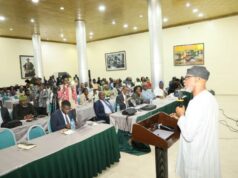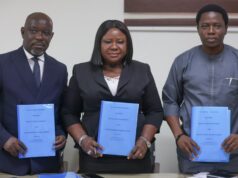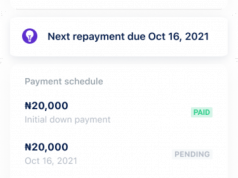WHO’s funding needs for the response are US$98 million, of which US$44 million have been received, leaving a gap of US$54 million
THUR, JUNE 20 2019-theG&BJournal- The Ebola outbreak in the Democratic Republic of the Congo (DRC) will only end with bipartisan political cooperation and community ownership, according to the World Health Organization’s Director-General, Dr Tedros Adhanom Ghebreyesus. He was speaking to Member States in Geneva after returning from a visit to DRC, where he reviewed the health response and met with leaders from multiple sectors to galvanize their commitment. The organization is also facing a severe funding gap for the response.
“Political cooperation must come from across party lines and across borders,” said Dr Tedros. “Bipartisan political leadership in DRC is the only way that communities will eventually understand the threat of Ebola and take ownership in ending the outbreak. Meanwhile, other countries have a global responsibility to support the dedicated health responders—from DRC, from across Africa and across the world—who are bravely working to save lives.”
WHO’s funding needs for the response are US$98 million, of which US$44 million have been received, leaving a gap of US$54 million. The funding shortfall is immediate and critical: if the funds are not received, WHO will be unable to sustain the response at the current scale. Other partners are also facing shortfalls that have led some to reduce or stop operations. The response risks being driven by decisions related to financial capacity rather than operational needs.
During his most recent visit to DRC, Dr Tedros met with Prime Minister Sylvester Ilunga Ilunkamba and opposition leaders—including Martin Fayulu and Mbusa Nyamwisi—as well as religious leaders and partners in Kinshasa, followed by meetings in Butembo, one of the outbreak’s hotspots, with community, religious, business leaders and partners, including non-governmental organizations and other UN agencies. Dr Tedros said, “I met with many leaders from all sectors of society. They agreed that they all have a role to play to help people understand the gravity of this disease. The virus steps between the gaps when we do not join hands.”
This was Dr Tedros’ ninth mission to the country. His most recent visit to Butembo was in late April after multiple attacks on health workers and facilities, and the death of colleague Dr Richard Mouzoko left taff fearful but still determined to end the Ebola outbreak.
“The last time I was in DRC it was a very difficult time,” said Dr Tedros. “But the hundreds of responders working to end this outbreak are committed because the people of DRC need their help. So we sat together to find ways to revitalise and strengthen the response. I returned this time to review progress, and to see whether the changes needed have been made and are working.”
Clear needs were identified at that time, for a more secure working environment, and for more participation by other UN partners and non-governmental organizations. Another clear need was better use of the Ebola vaccine, which is a very effective tool if provided to all people who have been in contact with a confirmed case. Vaccination is being stepped up and offered to more people, including pregnant and breastfeeding women, and children over six months old (rather that only 1 year and older). The new protocol was launched by Dr Tedros on Sunday in Katwa, another Ebola hotspot.
The adaptation of the strategy is now showing signs of paying dividends, with better trends in Butembo and Katwa, though Mabalako is becoming a new hotspot.
In two days of meetings in Uganda, Dr Tedros met with the Ugandan President Yoweri Kaguta Museveni, Minister of Health, Dr Jane Ruth Aceng, the leadership of Uganda Virus Research Institute, UN Resident Coordinator Rosa Malango, US Ambassador Deborah Malac and others. The country has been in response mode since last week when they confirmed Ebola in three people who had been infected in DRC. Since then, sadly all three of those cases have died, while no further cases have been confirmed. Dr Tedros noted that the country’s investment in preparedness had led to the rapid response.
“After seeing the rapid response in Uganda, I can only urge the international community to continue to support the preparedness activities on-going there and in neighbouring countries,” said Dr Tedros. “We have seen concretely how this investment saves lives by controlling the spread of a dangerous pathogen.”=APO Group.
|twitter:@theGBJournal|email: info@govandbusinessjournal.com.ng|









